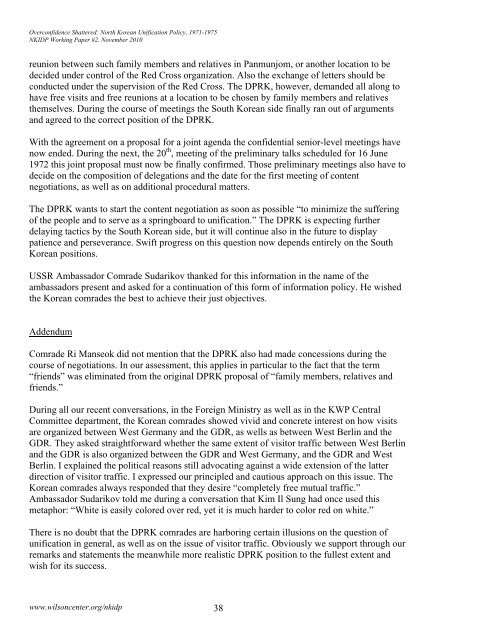Overconfidence Shattered: North Korean Unification Policy, 1971 ...
Overconfidence Shattered: North Korean Unification Policy, 1971 ...
Overconfidence Shattered: North Korean Unification Policy, 1971 ...
- No tags were found...
You also want an ePaper? Increase the reach of your titles
YUMPU automatically turns print PDFs into web optimized ePapers that Google loves.
<strong>Overconfidence</strong> <strong>Shattered</strong>: <strong>North</strong> <strong>Korean</strong> <strong>Unification</strong> <strong>Policy</strong>, <strong>1971</strong>-1975NKIDP Working Paper #2, November 2010reunion between such family members and relatives in Panmunjom, or another location to bedecided under control of the Red Cross organization. Also the exchange of letters should beconducted under the supervision of the Red Cross. The DPRK, however, demanded all along tohave free visits and free reunions at a location to be chosen by family members and relativesthemselves. During the course of meetings the South <strong>Korean</strong> side finally ran out of argumentsand agreed to the correct position of the DPRK.With the agreement on a proposal for a joint agenda the confidential senior-level meetings havenow ended. During the next, the 20 th , meeting of the preliminary talks scheduled for 16 June1972 this joint proposal must now be finally confirmed. Those preliminary meetings also have todecide on the composition of delegations and the date for the first meeting of contentnegotiations, as well as on additional procedural matters.The DPRK wants to start the content negotiation as soon as possible “to minimize the sufferingof the people and to serve as a springboard to unification.” The DPRK is expecting furtherdelaying tactics by the South <strong>Korean</strong> side, but it will continue also in the future to displaypatience and perseverance. Swift progress on this question now depends entirely on the South<strong>Korean</strong> positions.USSR Ambassador Comrade Sudarikov thanked for this information in the name of theambassadors present and asked for a continuation of this form of information policy. He wishedthe <strong>Korean</strong> comrades the best to achieve their just objectives.AddendumComrade Ri Manseok did not mention that the DPRK also had made concessions during thecourse of negotiations. In our assessment, this applies in particular to the fact that the term“friends” was eliminated from the original DPRK proposal of “family members, relatives andfriends.”During all our recent conversations, in the Foreign Ministry as well as in the KWP CentralCommittee department, the <strong>Korean</strong> comrades showed vivid and concrete interest on how visitsare organized between West Germany and the GDR, as wells as between West Berlin and theGDR. They asked straightforward whether the same extent of visitor traffic between West Berlinand the GDR is also organized between the GDR and West Germany, and the GDR and WestBerlin. I explained the political reasons still advocating against a wide extension of the latterdirection of visitor traffic. I expressed our principled and cautious approach on this issue. The<strong>Korean</strong> comrades always responded that they desire “completely free mutual traffic.”Ambassador Sudarikov told me during a conversation that Kim Il Sung had once used thismetaphor: “White is easily colored over red, yet it is much harder to color red on white.”There is no doubt that the DPRK comrades are harboring certain illusions on the question ofunification in general, as well as on the issue of visitor traffic. Obviously we support through ourremarks and statements the meanwhile more realistic DPRK position to the fullest extent andwish for its success.www.wilsoncenter.org/nkidp 38
















